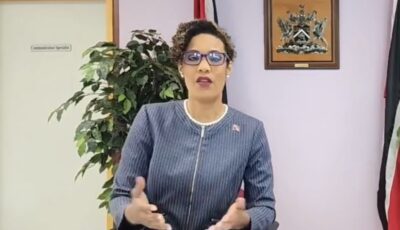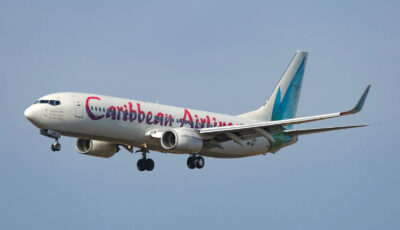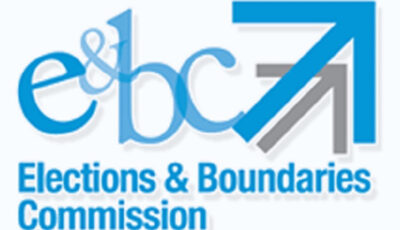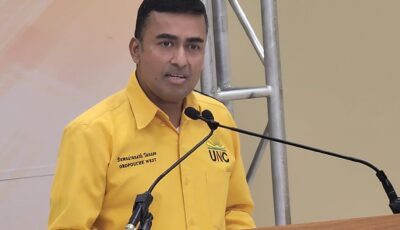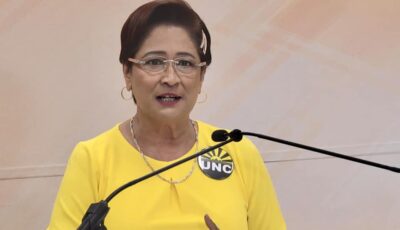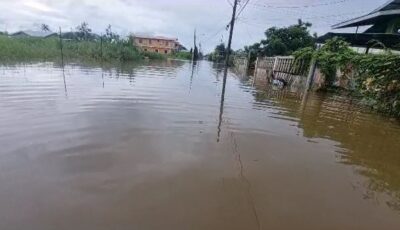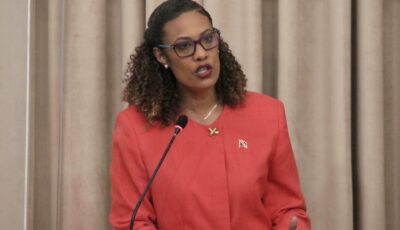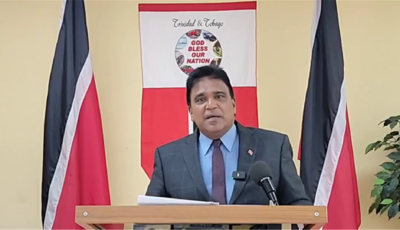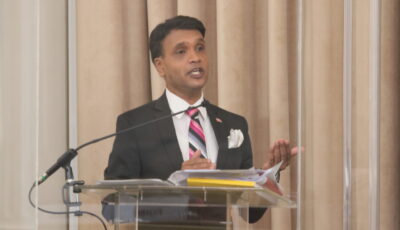Kamla: A budget of deception
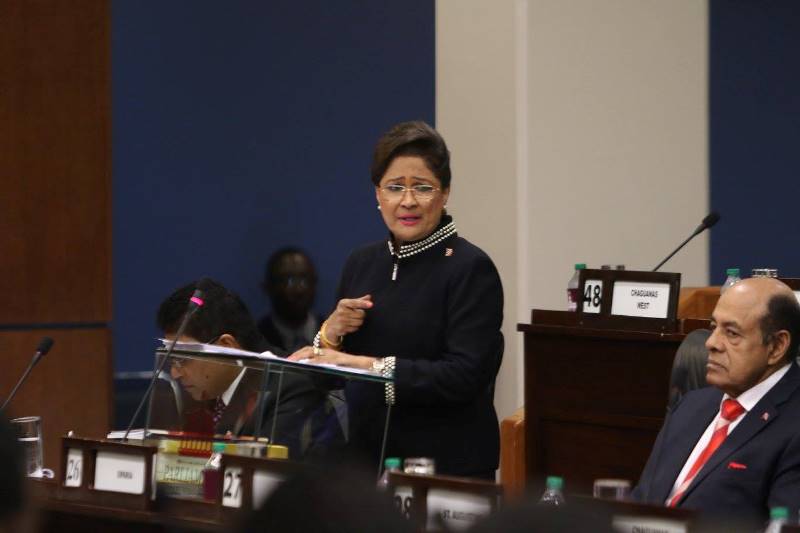
The Leader of the Opposition, Hon. Kamla Persad Bissessar
Photo Courtesy: Parliament of Trinidad and Tobago
The PNM’s 2016 budget of deceptive figures will place financial pain on the poor, middle class, workers, small and medium businesses and everyone to whom costs are being passed on, Opposition Leader Kamla Persad-Bissessar warned yesterday.
Delivering the first budget reply in her new position as Opposition Leader, Persad-Bissessar added in Parliament yesterday, “This budget appears designed to punish the poor and a vast majority of citizens … to create financial hardship among those least able to manage it. The (Finance) Minister speaks of sharing the burden, even unions joined the PNM’s chorus of the need to share the burden. In reality, it’s only the lower and middle income who are sharing this burden. The deception is in the numbers. The devil is in the figures.”
“The PNM has given T&T half a budget, costing $63 billion with a deficit of $21 billion dollars and, in the same breath talking fiscal discipline, then they tell us the real budget will come next March…when the IMF arrives? So, citizens: hold your breath as you wait to exhale when the real budget comes.
“These 2015 numbers are debatable. We’ll only know the real numbers some months from now, (but) the facts and figures will drown out the deception,” she said.
Persad-Bissessar faced continuous haranguing from PNM members at the start of her speech. House Speaker Bridgid Annisette-George had to call for order numerous times during Persad-Bissessar’s two-hour address. Annisette-George at one point had to tell Finance Minister Colm Imbert she was hearing him.
Saying there were many deceptive elements in the budget, Persad-Bissessar said Imbert’s presentation lacked context in his accusation of PP economic “mismanagement.”
She began her address detailing and defending the PP’s economic handling, denying wastage and explaining government’s overdraft with the Central Bank.
On budget implications, Persad-Bissessar said the personal allowance increase worked out to allowing individuals $250 more monthly, “or the princely sum of $8 per day, these days that can’t even buy two doubles.”
Additionally, the VAT measures and fuel costs negated any benefit citizens would have received from this, she added.
Persad-Bissessar questioned who would benefit from a reduction of VAT from 15 to 12.5 per cent.
She said, “Already the items described as essentials: foodstuff, medication, etc, are VAT free. So it’s more likely persons involved in the purchase of luxuries will benefit.
“The situation is more deception: what the minister is really offering T&T is an increase in the money every person spends on VAT, because the vulnerable, poor, the single-parent households, the elderly, those most in need are now going to be penalised by having to pay VAT on a secret wide range of goods which previously had no VAT.”
She said the PP removed VAT on all food items, but retained it on luxuries and alcohol.
“The PNM Government is seeking to undo that not only by raising the prices of food and other items on their secret list by 12.5 per cent. But prices will escalate by substantially more than 12.5 per cent as a direct consequence of this.”
Persad-Bissessar added, “The minister glossed over that the average citizen will have to pay more for food and basics.
“He already knows what items will be VATable because he was able to calculate what the tax returns. Which foods is he taxing? Coffee? Sardines? Ghee? Curry? Corned beef? Crix? Ketchup? Cooking oil?”
She noted VAT-free items included pharmaceuticals, steelband equipment, agricultural and energy sector inputs, books, rental properties, communication and sports inputs.
“The multiplier effect of this measure on these is a retrograde step, with inflationary repercussions,” she said.
Persad-Bissessar questioned Imbert’s indication that widening of the VAT base would yield $4 billion from citizens since budget revenue documents show 2016 VAT collection of $12 billion. “He’s misled us with the $4 billion figure and needs to explain how you get double revenue if you reduce VAT.”
The effect of increasing the threshold for VAT to $500,000 also means an increase in the cost of doing business, she noted.
“Particularly for small businesses and new start-ups, as they would be unable to claim their input VAT through the system. This doesn’t affect big businesses. But when this is tied to the Business and Green Fund Levy increases in the budget, it’s a triple whammy against small and micro-enterprise businesses.
“Every parlour will feel this, every small retail outlet, everyone seeking to open new business…unless you’re a big businessman in which case you’d cross the limit and be able to reclaim VAT.”
Levy will bring strife
Persad-Bissessar said the 200 per cent Business Levy increase would increase the tax liability of those businesses already making a loss/negligible profit.
“In the current economic climate with rising cost of doing business, falling revenues and profits, this penalises small-medium businesses and may contribute to them going out of business—another penalty for small business.”
Persad-Bissessar said the PNM, in raising this tax, appeared to recognise the adverse effect the budget would have on such businesses.
“How else does one explain that with an average of $219.3 million in revenue from the Business Levy between 2010 to 2015, he raises the tax by 200 per cent but the actual increase in revenue projected isn’t a commensurate 200 per cent but 175 per cent of that? Is it that more small/medium businesses will simply close?”
She echoed similar concerns regarding the Green Fund Levy.
“And it’s obvious these costs will be passed to the consumer via higher prices.”
Persad-Bissessar said despite the PNM’s “crown jewel,” that is, the “$10 billion National Security allocation, analysis showed the funding hike was for expense for the combination of Justice and other portfolios with National Security and has nothing to do with crime-fighting initiatives. …Hoax or deception. ‘Plenty’ money for National Security, but little to fight crime.”
Persad-Bissessar queried the fact that the property tax wasn’t listed under “land and building tax” or the property tax the PNM had passed, but under “a strange new heading—Industrial Land Tax.”
She said Imbert had delivered a contradictory budget statement seeking to continue the adversarial election campaign “not to unite our people for the necessary adjustment or the change in thinking…he appears to be setting the stage for when his plans fail by placing his responsibility on the private sector’s shoulder when he says economic recovery will depend critically on that sector’s reaction.
“(But) there’s little in the budget to generate business confidence, motivate significant investment and nothing to ease the labour shortage and improve productivity.”
Slamming Imbert’s “Let’s Do This Together” call, she added, “It’s a betrayal to ask everyone to do this together and then alienate so many by branding them guilty of malfeasance and betrayal when an assurance is given there will be no job loss, yet daily we read about more and more job losses.
“Budget statements show the new Government more concerned with scoring political points than dealing with T&T’s fundamental problems.”
Persad-Bissessar warned the global economy remained caught in the doldrums.
“It’s important that actions that could result in further economic contraction are avoided and efforts are made to mitigate the effect of the restructuring that must take place, and its effects on the poor in our country. Unfortunately the budget’s positions give little hope that the current Government understands the problem or have policy prescriptions they can offer.”
She concluded, “The last time I made a budget contribution, a PNM MP dismissed it as ‘arrant nonsense and foolishness’ and while I wouldn’t say his budget speech was that, there are many who’ve said his speech was exactly that.”

